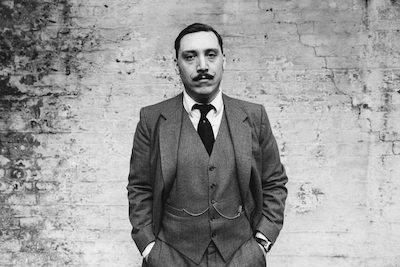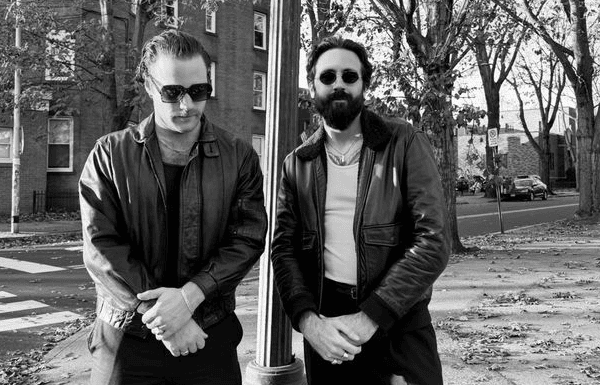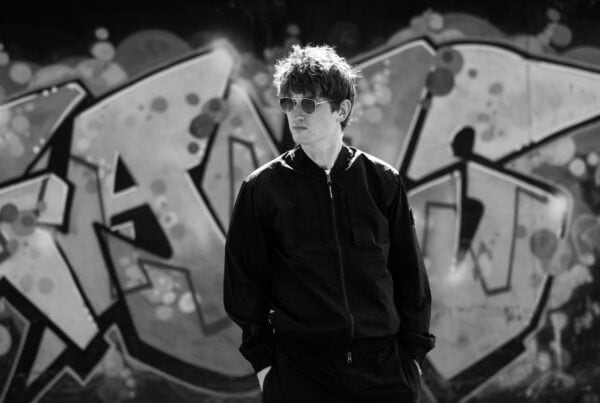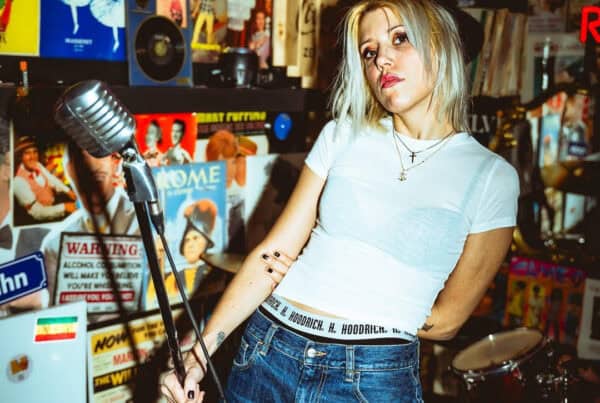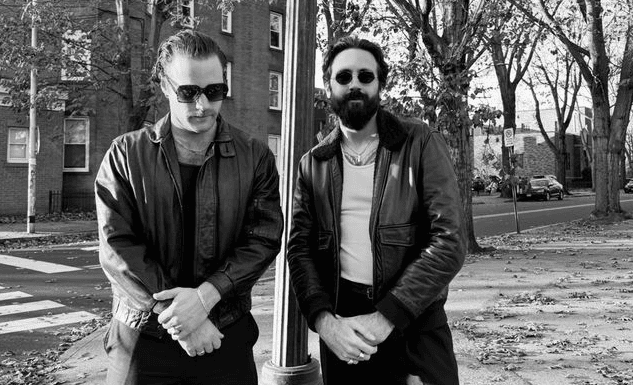In our latest interview we had a chance to talk to the legendary Jamie Lenman, formerly of Reuben, about his latest solo album, ‘Muscle Memory’, a two disc album that displays Lenman’s harder and softer sounds. We also chat to Jamie about his illustration career, inspirations and what he may or may not be planning for the future.
“I’d like to be remembered as someone who tried really hard to be honest about art and himself”
S] You’re playing a show in Manchester soon. Have you got any memories from the city? Are you looking forward to coming back to the North?
JL] “The first things I think of when I think of Manchester are Oceansize and Kong. I don’t know if you’ve heard the song ‘We’re All Going Home in An Ambulance’ (from Reuben’s ‘In Nothing We Trust’), it’s a song about a guy who came out of the woods having beaten up black people and was covered in blood, that was in Manchester and that was terrifying to me. So I have good and bad memories of Manchester, but on the whole I adore Manchester, I love the North. My wife is from Durham so we go up North a lot and York and Leeds are wonderful, all great places.”
S] Looking back on your career with Reuben up to now, how do you feel you’ve changed through your music?
JL] “The biggest difference is that if you compare me now to me at the start of Reuben, I wanted attention and I thought if I wrote the songs everyone would pay attention to me, but now nothing could be further from the truth. That’s part of the reason that going on tour is a challenge to me because I’m a lot shyer than I was. I think that’s a standard thing that tends to happen, when you’re a teenager or early twenties like we were you need more attention and reassurance whereas these days I’m happy to fly under the radar a bit. As the years have gone on I think I’ve gotten better at catching myself. If you’re in the habit of writing songs you end up analysing your actions and thinking why you did that. I think more people should be encouraged to do that, I think we’d all know ourselves better if we were forced to look at ourselves and see the change.”
S] How did you get over your nerves of performing again after having a break from the stage?
JL] “One of the biggest factors was that I would still get letters from people or see people on the street who would tell me that they dug the record and wanted new music or to see the band live. I was aware that if I would step out on the road that the venues wouldn’t be empty, that was very helpful to have that support. But I have this brilliant label, Xtra Mile, looking after the release for me. I think if you ask someone else to invest money and effort in your release then you’re obliged to sell it. I’m going to play shows and whether you like it or not is a promotional tool to get the album out there. I think I owe that to the people that have worked so hard to try to get it noticed and made properly.”
S] You’ve got an interesting vocal range. How did you discover your voice in the beginning of your career?
JL] “I was always singing, since I was a kid and I think one of the things that helped develop a loud voice was in my first band when we were kids we would practice in a back room with no microphones. So I had to try to sing louder than the drum kit so everyone could hear me. When I started listening to heavier music I tried to get that scream tone from other vocalists like Max Cavalera and even Fred Durst. It was like in the Lion King when little Simba tries to scare the lizard with a growl and it’s really embarrassing. I would make this sounds that I thought were really heavy but I was only 12. Gradually about the time we put out our first EP I managed to get that really loud sound out. As far as the softer singing was concerned, one of my good friends, Vincent Oliver was making music by himself and like me he wasn’t really a singer but he used that to his advantage. He told me to sing how you speak, don’t pull out voices, just sing as if you’re speaking softly and I took that very much to heart. On the soft track on this record I try not to put too much effort in.”
S] Between the quiet and loud songs, which are easiest for you to go into?
JL] “I think with the full band it might have been easier to do the heavy stuff because of the loud guitars and the drums. There’s hardly any singing on that first half of this record but I think if you put singing over the top it’s very similar to what I’ve done before whereas I really had to think hard about some of the soft stuff. The metal side of the record is 2 guitars, a bass and drums, as always. But on the soft side almost every track is a different arrangement of different instruments and that was a lot tougher, I had to think about that.”
S] On the new album, ‘Muscle Memory’ you have the songs ‘Six Fingered Hand’ and ‘Pretty Please’ which have completely different sounds. Can you tell us the inspirations behind these two tracks?
JL] “I remember I was ribbing that Frank Turner stole all my ideas, which isn’t true, and I can trace ‘Pretty Please’ back to when I saw one of Frank’s very first solo shows and he sang his brilliant song ‘Romantic Fatigue’ which was so honest about how boys tend to use songs as a wooing factor and it works, I have to say. I thought it was so funny and honest for Frank to write this song and say, ‘this song isn’t for you, it’s for some other girl’, and it got me thinking about why we wrote songs. That’s where ‘Pretty Please’ came from and other things you do to get attention. Even though my wife is a model and a dancer, that person in the song stands for all performers and the Dad character in the song does as well, my dad isn’t an actor. Thinking about why we do the things we do, it’s for encouragement and validation, certainly a part of what I do is for that. As for ‘Six Fingered Hand’, I wanted to write something heavy. I wrote that towards the end of Reuben. I just knew I wanted to write something really uncompromising and I’d been listening to Strapping Young Lad and Everytime I Die. When I came to write the lyrics they were sort of bending in a different way. This song was about how disappointed I was in the first decade of the twenty-first century. There was a recent Persil advert that showed the same woman in all these different decades and when this advert got past the eighties you just couldn’t tell what decade it was meant to be because for the past twenty five years there’s been no identity. The nineties were cool but since then there have been no innovations in design or music. It’s our generation, it’s our fault. Even though I was trying with that band to make interesting music I don’t think I tried hard enough to give that decade identity. That song is about how all the artists including my peers and myself, sort of failed to give an identity.”
S] You work as an illustrator too. Do you ever find inspirations through illustrations for songs or is it completely different for you?
JL] “They are different headspaces, I can’t think of an instance where my illustration work has informed my musical work or vice versa. The physical CD of the record is packed with a large scale illustration that I created especially for it, so in that small bubble the two worlds do collide. Gerard Way from My Chemical Romance has written his own comic book which is really great so there are places where these two combine. But I couldn’t say that I’ve taken any influence from my illustrative work into the music. However I am talking with a couple of guys at my job about forming a company band because a lot of people at this place can play instruments. Our songs would be about troublesome clients, it would be a rock band about design.”
S] How did you get into illustration and how do you divide your time between that and music? What appealed to you about illustration?
JL] “For me I found it’s a much more stable career. I was always drawing cartoons since before I picked up a guitar and when I was playing guitar the illustration was a hobby so to speak. Due to my contacts, for instance I met the editor of Rock Sound while I was at a gig for Reuben so that’s how I started to get my first few professional gigs, through music. Music at that point was my main job, illustration was my hobby and then when Reuben finished and I stopped doing music full time, illustration became my main job and music was my hobby and that’s where I am now. Even though this album has taken four years and I’ve put a lot of effort into it, it is effectively a hobby. I’ve done it for my own pleasure rather than to make money. They’ve always existed side by side, my main two passions. I studied both at college and I picked up loads of techniques there. We may get to a point again where music becomes my main thing and illustration becomes a hobby, it flip flops.”
S] Are you still inspired by the same stuff that inspired Reuben’s material or is it different now as a solo artist?
JL] “I think they are broadly the same, I consider my work with Reuben to be no different from what I’m doing now. I don’t approach songs any differently from how I did back then although perhaps I have a slightly freer rein to mess around with the genres. In terms of subjects and lyric matter it’s sort of the same. The first couple of Reuben records, most of the subject matter was about personal things and by the time we were doing ‘In Nothing We Trust’ I opened it up a bit to historical matters and more philosophical things and by the time we get to this record, ‘Muscle Memory’, it’s sort of an even mix. Some areas of this record are way more personal than I was able to go with Reuben because I was speaking on behalf of three people, not just myself, but the philosophical issues have broadened out a bit. Nothing intentional, it’s just what comes out of my brain.”
S] How do you look back on the success and good times you had in Reuben?
JL] “I’m very proud and happy about the whole thing. I don’t really see this as very different, I don’t wish to draw a curtain between what I did with Reuben and what I’m doing now. I think absence makes the heart grow fonder, Reuben’s gotten more popular since it stopped happening and it’s mostly good memories. Although it’s important not to forget the bad memories, your brain often filters out the bad memories. Even though it may sound odd I do try my hardest to remember the bad times because otherwise I’d end up back in another band. We were very young and there was a lot at stake so when things didn’t go right, it’s important not to forget that. If we forget, we went through all that for nothing, but I don’t forget the good memories.”
S] You don’t have any major plans past the album and the tour – are you excited to see this record and the tour blow up?
JL] “There are no plans and that’s very deliberate. As easy as it is to get excited especially when people have been generous with the reviews and the reception of the record, you could easily want to quit your job and tour the world and I’m trying not to do that, I’m trying to take it as it comes. That way you don’t get disappointed if certain things don’t happen. I’m treating this album and future albums in the same way that I treat all the stuff I do whether I’m going to do animations and I’m working on a couple of books at the moment. They’re all artistic projects and I treat them the same. Music is no longer my career whereas back in the day we had to plan and these days I don’t have to, I can just do it literally when I please so I’m excited about that. I’m excited that maybe six months or a year or two down the line if I have another twelve songs that I feel are good enough for people to listen to then I can record them and put them out on a good label, probably Extra Mile, and see what happens. You spin this record like a Frisbee into the world and you wait to see if it’s going to get caught in a tree or snatched up by a dog, what’s going to happen? I’m excited about that.”
S] How would you like to be remembered as a musician and a person?
JL] “I’d like to be remembered or thought of as someone who tried really hard to be honest about art and about himself and who tried really hard to innovate and create interesting and original art. That’s all you can ask for and all you can be as a person, honest and original. I couldn’t say that I am one hundred percent honest or original, but what I can say is that I’ve tried.”

